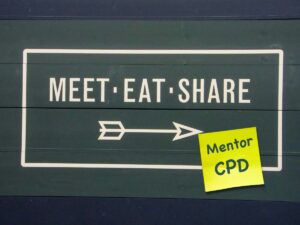 After seven years and 1,500 participants from more than 60 countries, the WWF Mentoring Team felt it was time to take the Global Mentoring Programme to the next level—and introduce a digital mentoring platform. The goal was never to replace the human element that makes our programme special, but to find a way to scale its benefits and make it accessible to a wider audience across the WWF Network without increasing the workload. At the same time, we wanted to stay aligned with rapid technological developments in the digital age. Continue reading
After seven years and 1,500 participants from more than 60 countries, the WWF Mentoring Team felt it was time to take the Global Mentoring Programme to the next level—and introduce a digital mentoring platform. The goal was never to replace the human element that makes our programme special, but to find a way to scale its benefits and make it accessible to a wider audience across the WWF Network without increasing the workload. At the same time, we wanted to stay aligned with rapid technological developments in the digital age. Continue reading
High-performing teams and leaders; Creating space to create clarity

Margerison-McCann Team Management Wheel™
I am always delighted when individuals who receive praise also acknowledge the wider team that contributed to their success. Even more so when they can clearly articulate how and in what ways their colleagues supported them. “It’s a team effort.”, “I’d like to thank my team…”. Members of high-performing teams are clear about their own strengths and how they best work together. Do you have that clarity in your team?
Continue reading
Interactive free mentor CPD — winter 2026 lunchtime schedule
 Our winter season of short free mentor CPD is here. Our guest speakers will take you deeper into the use of an ikigai mindset, considering how mentoring can impact an organisation, exploring strength-based mentoring, using stories as a mentor and providing ongoing support for mentors. Please come and share some interesting ideas. It’s going to be an inspiring series of lunchtimes!
Our winter season of short free mentor CPD is here. Our guest speakers will take you deeper into the use of an ikigai mindset, considering how mentoring can impact an organisation, exploring strength-based mentoring, using stories as a mentor and providing ongoing support for mentors. Please come and share some interesting ideas. It’s going to be an inspiring series of lunchtimes!
Dents in the Universe: Why we’re becoming a Social Enterprise
 After more than twenty years in coaching and mentoring, there’s one thing that’s never changed for us: a belief that business has to be about more than just profit. It’s about people; about leaving the world better than we found it. That’s why today, we’re incredibly proud to share that Coach Mentoring Ltd. is taking a bold new step and becoming a Social Enterprise. Continue reading
After more than twenty years in coaching and mentoring, there’s one thing that’s never changed for us: a belief that business has to be about more than just profit. It’s about people; about leaving the world better than we found it. That’s why today, we’re incredibly proud to share that Coach Mentoring Ltd. is taking a bold new step and becoming a Social Enterprise. Continue reading
Short, free, interactive, lunchtime mentor CPD — Autumn 2025
 This autumn, a short series of free mentor CPD. Our guest speakers will take you from a framework for deepening mentoring conversation, via mentoring with Ikigai, to a discussion of mentoring and burn out. So come, meet some interesting people, eat your lunch maybe and definitely share some interesting ideas. It’s going to be an inspiring series of Monday lunchtimes!
This autumn, a short series of free mentor CPD. Our guest speakers will take you from a framework for deepening mentoring conversation, via mentoring with Ikigai, to a discussion of mentoring and burn out. So come, meet some interesting people, eat your lunch maybe and definitely share some interesting ideas. It’s going to be an inspiring series of Monday lunchtimes!
Accredited & certified coaching and mentoring postgraduate course
 Build your coaching skills on top of your existing specialisms, to develop your own coaching identity. This Level 7 PGCert, accredited by Leeds Beckett University, also provides fast-track award of EMCC Senior Practitioner from one of the leading coaching and mentoring bodies. You will find the interactive live webinars grounded in your life and leadership experiences. Through your study, you will create your own individual coaching and mentoring approach, rather than slavishly following taught models.
Build your coaching skills on top of your existing specialisms, to develop your own coaching identity. This Level 7 PGCert, accredited by Leeds Beckett University, also provides fast-track award of EMCC Senior Practitioner from one of the leading coaching and mentoring bodies. You will find the interactive live webinars grounded in your life and leadership experiences. Through your study, you will create your own individual coaching and mentoring approach, rather than slavishly following taught models.
The Power of Good Questions — in coaching, at work and in life
 Good questions lead to good listening (and vice versa: good listening leads to good questions)! They build interpersonal bridges and create connections. Questions such as: ‘What moves you?’, ‘How does that make you feel?’ or ‘Would you like to tell me more?’ are usually sufficient. Yet it is more helpful to ask a disbeliever ‘What makes you doubt?’ than to give them advice, nag them or try to reassure them with ‘It’s not that bad’.
Good questions lead to good listening (and vice versa: good listening leads to good questions)! They build interpersonal bridges and create connections. Questions such as: ‘What moves you?’, ‘How does that make you feel?’ or ‘Would you like to tell me more?’ are usually sufficient. Yet it is more helpful to ask a disbeliever ‘What makes you doubt?’ than to give them advice, nag them or try to reassure them with ‘It’s not that bad’.
Core coaching skills can change you as a Manager
 Being a manager is tough, I’d argue it to be the toughest job in any organisation. You’re expected to deliver the strategy from above while also supporting, motivating, and developing the people in your team. In today’s working world, without core coaching skills, that squeeze can feel relentless.
Being a manager is tough, I’d argue it to be the toughest job in any organisation. You’re expected to deliver the strategy from above while also supporting, motivating, and developing the people in your team. In today’s working world, without core coaching skills, that squeeze can feel relentless.
The Evolution of ‘Personnel Management’ to the ‘People and Culture’ Team
 The transition of the ‘people function’ title to ‘People and Culture’ represents a fundamental shift in how organisations view their workforce. Linda Grant explores the evolution of this function, now seen as being a strategic partner in achieving organisational goals.
The transition of the ‘people function’ title to ‘People and Culture’ represents a fundamental shift in how organisations view their workforce. Linda Grant explores the evolution of this function, now seen as being a strategic partner in achieving organisational goals.
Listening. Better performance for the talker, the listener and organisation!
 ‘Listening leads to better performance — in the person who listens, in the person who is listened to and, as a consequence, in the whole organisation’, concludes listening researcher Guy Itzchakov [1]. Plus I would add: it also leads to better change processes and campaigns. So, why has listening training not long since become part of every organisational development project and campaign? Probably because people don’t think they have time for it.
‘Listening leads to better performance — in the person who listens, in the person who is listened to and, as a consequence, in the whole organisation’, concludes listening researcher Guy Itzchakov [1]. Plus I would add: it also leads to better change processes and campaigns. So, why has listening training not long since become part of every organisational development project and campaign? Probably because people don’t think they have time for it.
